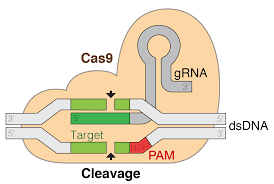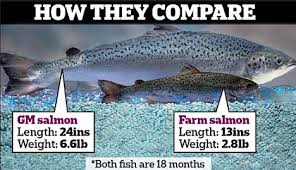GMOs
CRISPR Approaches to Environmental Problems
Breakthroughs in gene editing might open the door to improved environmental protections. Or maybe not.
CRISPR is a breakthrough gene editing method. (I can’t refrain from noting that a key role in the discovery was played Jennifer Doudna at Berkeley.) There are potential risks from gene editing to the environment, similar to other types of GMOs. But there may be environmental benefits too. Here are a few that have been …
Continue reading “CRISPR Approaches to Environmental Problems”
CONTINUE READINGCould FDA’s Approval of GMO Salmon Actually Be Good for the Environment?
Farmed GMO fish could help reduce pressures on wild stocks.
FDA has — after more than two decades of consideration — approved the marketing of genetically modified salmon in the U.S. As the NY Times reports, this decision has had push-back from the quarters you might expect . Says one critic: “This unfortunate, historic decision disregards the vast majority of consumers, many independent scientists, numerous members …
Continue reading “Could FDA’s Approval of GMO Salmon Actually Be Good for the Environment?”
CONTINUE READINGGuess Who’s Coming For Dinner?
We need research to feed a larger population without plowing the whole planet.
Who’s coming for dinner? The answer, in case you’re wondering, is “two billion more people.” That’s the population increase predicted for 2050. How are we going to feed those people? One method is to cut down a lot of the world’s remaining forests and plow the world’s remaining grasslands. That’s a bad approach environmentally: it will …
Continue reading “Guess Who’s Coming For Dinner?”
CONTINUE READINGEvaluating Prop 37
Rick Frank posted about a UC Davis white paper on Prop 37, which provides detailed background on the ballot measure. For those who want something that just lays out the issues concisely, I’d recommend Ezra Klein’s post on the subject. It’s brief and fair-minded to a fault — I’m sure partisans on the issue would …
Continue reading “Evaluating Prop 37”
CONTINUE READINGGenetically Modified Foods: a Controversial New Study and Prop. 37
Genetically modified organisms are in the news these days for two big reasons. First, California voters will decide in November whether to require the labeling of foods that have been genetically engineered. And second, a new study — subject to significant criticism even from some who advocate labeling — found that rats fed with genetically …
Continue reading “Genetically Modified Foods: a Controversial New Study and Prop. 37”
CONTINUE READING






